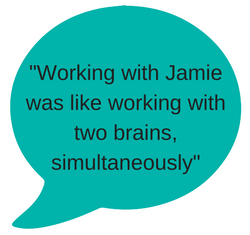 Have you ever done a BBC Radio interview with a cat attached to your leg?
Have you ever done a BBC Radio interview with a cat attached to your leg?
Afraid to say I have. It went well, but it was pretty painful: claws are sharp, especially at 6:15 in the morning when the cat is ravenous.
It was several years ago: I was consulting as head of external affairs for a national organisation, and had secured the interview with their CEO – but he’d asked me to take his place late the night before.
And I was well prepared, but the confirmation email from the BBC said they’d be phoning at 7:15am. So when the call came at 6:15 and they wanted to do the interview straight away, I was standing in my dressing gown, and had been about to feed the cat. The cat was not impressed.
Talking about painful interviews: did you watch Jeremy Paxman’s interviews with Theresa May and Jeremy Corbyn earlier this week? What did you think?
I spoke with a few clients (business and social enterprise leaders) afterwards – of varied political allegiances (including several “undecideds”) and something that came up in conversation several times was a frustration with Jeremy Paxman’s interviewing style.
From the frequent interruptions to Paxo’s talking over (and therefore missing) both May’s and Corbyn’s answers, his technique (so famously effective a few years ago when asking Michael Howard, then Home Secretary, the same question 12 times) annoyed plenty of viewers.
When I’m interviewing people on the radio, I like to credit listeners with enough intelligence to listen to the answers my guest gives. Listeners themselves can read between the lines if they need to.
That’s not about polite deference, nor shying away from asking hard questions. It’s not about avoiding asking an interviewee about the key issues. Compare Jeremy Paxman to, say, Emma Barnett or Eddie Mair – they give their subject the opportunity to answer the tough questions they ask.
Anyway: if you’re likely to be interviewed, whether for radio or TV, or by a print or digital journalist, make sure you’re ready and prepared.
That includes being prepared for the obvious questions that will come up – but also preparing for the interviewer’s style of questioning. Then you won’t be flustered by their approach.
And whoever you intend to vote for in the election, listen to the ceaseless tide of political interviews with an analytical hat on. Forget the party: is the interviewee prepared, do they bring their answers back to a theme supported by appropriate talking points, how are they dealing with hostile or trick questions? And if they’ve obviously been media trained, do they sound like a robot or a human?
I’ve got loads of examples of interviews that went really well despite a tough setup, and plenty of examples of complete interview fails. Some of these (good and bad) are politicians (of all stripes) but plenty – most in fact – are from the world of business.
We tend to analyse these in media training sessions, before running through techniques to help improve your performance in an interview, whatever the context. And the sessions I’ve delivered recently, all over the UK and for leaders of businesses, social enterprises, and in the public sector have boosted participants’ skills and confidence for the interviews they need to do. So please drop me a line if you’d like more details.



Speak Your Mind